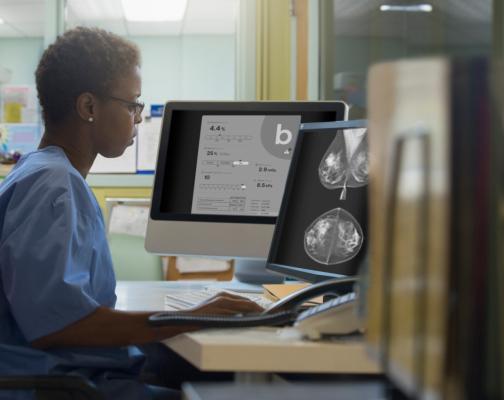
New studies presented at the 2023 European Congress of Radiology from Volpara Health demonstrated the important role artificial intelligence plays in objective breast density assessment, cancer risk assessment, and mammography quality evaluation to personalize and optimize breast cancer detection. Photo courtesy Volpara Health Technologies.
March 9, 2023 — Research focused on the use of AI in breast screening was presented by Volpara Health Technologies Ltd., a provider of software for the early detection of cancer, at the recent 2023 European Congress of Radiology (ECR). The new studies from Volpara demonstrated the important role artificial intelligence plays in objective breast density assessment, cancer risk assessment, and mammography quality evaluation to personalize and optimize breast cancer detection.
The new study results presented at ECR add to numerous other published, high-profile studies to validate the benefits of its the firm's software solutions, according to a statement released by the Lynwood, CA-based software firm at the conclusion of ECR, held March 1-5 in Vienna, Austria, which summarized highlights from six oral presentations and posters:
- Pairing the AI computer-aided-detection system Transpara with Volpara volumetric density assessment improved screening efficacy for women with dense breast tissue compared to a traditional double read by radiologists
- Using Tyrer-Cuzick with volumetric density assessment from Volpara Scorecard to identify and triage intermediate and high-risk patients for ultrasound resulted in a higher cancer detection rate than traditional biennial mammography
- Evaluating radiographer performance with Volpara Analytics software helped improve quality regardless of experience level
"Increasing our understanding of breast cancer risk, detection and prevention is essential to ensuring every patient is given the right care at the right time," said Teri Thomas, Volpara CEO. He added, "The evidence presented at ECR comes at a moment when European screening programs are realizing AI gives them an opportunity to help more women with more personalized care. I'm eager to see this research put into practice."
The research includes personalized screening and optimization studies, such as the DENSE1, TOMMY2, and To-Be3 trials, and the PROCAS I/II4 and KARMA5 studies. A prime example, the DENSE trial, led by Professor Carla van Gils from the University Medical Center Utrecht, Netherlands, relied on Volpara’s TruDensity volumetric density product to identify women with extremely dense breasts in their randomized controlled trial of supplemental MRI that influenced the European Society of Breast Imaging's latest screening recommendations. The recommendations encourage reporting density to all women receiving mammography and recommending MRI for women aged 50 to 70 with extremely dense breasts.
Specifically addressing AI for breast density and cancer risk assessment triage, the studies and posters supported by Volpara technology included the following:
- “Artificial intelligence (AI) and mammographic extremely dense breasts in BreastScreen Norway: could AI-based screening be an alternative to screening with MRI?” Henrik Wethe Koch, et al. Notable finding: Pairing the AI computer-aided-detection system Transpara with Volpara volumetric density assessment improved screening efficacy for women with dense breast tissue compared to a traditional double read by radiologists.
- “Risk-based breast screening (RIBBS) in young women: stratification of population and cancer detection rate (CDR) from recruitment,” Francesca Caumo, et al. Notable finding: Using Tyrer-Cuzick with Volpara volumetric density assessment to identify and triage intermediate and high-risk patients for ultrasound resulted in a higher cancer detection rate than traditional biennial mammography.
- Contrast-enhanced mammography (CEM) as an alternative to breast MRI for screening of women at increased risk for breast cancer: preliminary results. Gisella Gennaro, et al.
- Automated breast ultrasound in comparison to 2D mammography, digital breast tomosynthesis, hand-held ultrasound in the detection of breast cancer: a cohort of 4500 examinations. Athina Vourtsi, et al.
Commenting specifically on the efficacy of Volpara Scorecard, Athina Vourtsi, PhD, of Athena Medical stated, "Quantitative assessment of breast composition using Volpara Scorecard is a great tool to give a reliable density score, especially in breast tomosynthesis where the synthetic view may not display density in the same way as what is seen by scrolling through the slices."
Focused on AI for mammography quality evaluation and optimization, Volpara presented two research papers.
“Breast positioning and compression in screening with tomosynthesis: use of automatic software to improve the performance of breast radiographers.” Gisella Gennaro, et al., the company reported notable findings that showed evaluating radiographer performance with Volpara Analytics software helped improve quality regardless of experience level. “Breast positioning indicators associated with mammograms repeated due to blur,” Melissa Hill, et al. was also presented.
The company statement summarizing findings presented at ECR noted that healthcare providers use Volpara to better understand cancer risk, empower patients in personal care decisions, and guide recommendations about additional imaging, genetic testing, and other interventions. Its AI-powered image analysis enables radiologists to quantify breast tissue with precision and helps technologists produce mammograms with optimal image quality, positioning, compression, and dose. It further noted that, particularly in an industry facing increasing staffing shortages, the software streamlines operations and provides key performance insights that support continuous quality improvement.
More information: volparahealth.com
Related Content:
Onsite Women’s Health and Volpara Health Announce National Partnership
Volpara Health Software Used in Largest Image Quality Evaluation to Date


 December 10, 2025
December 10, 2025 









